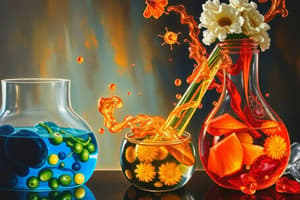Podcast
Questions and Answers
What is produced as a result of the photosynthesis reaction?
What is produced as a result of the photosynthesis reaction?
- Glucose (correct)
- Carbon dioxide
- Oxygen (correct)
- Water
In the photosynthesis reaction, what happens to carbon dioxide?
In the photosynthesis reaction, what happens to carbon dioxide?
- It is converted into energy directly.
- It is reduced to form glucose. (correct)
- It combines with oxygen to form glucose.
- It is oxidized to form water.
Why are redox reactions important in biological systems?
Why are redox reactions important in biological systems?
- They drive essential processes like respiration and photosynthesis. (correct)
- They are only important in industrial applications.
- They solely produce energy without any other process.
- They have no significance and are disregarded.
Which of the following is NOT an application of redox reactions in industry?
Which of the following is NOT an application of redox reactions in industry?
What is the overall purpose of understanding chemical reactions as mentioned?
What is the overall purpose of understanding chemical reactions as mentioned?
What occurs during a synthesis (combination) reaction?
What occurs during a synthesis (combination) reaction?
Which of the following is an example of a decomposition reaction?
Which of the following is an example of a decomposition reaction?
Which is NOT a type of chemical reaction discussed?
Which is NOT a type of chemical reaction discussed?
What is the general form of a synthesis reaction?
What is the general form of a synthesis reaction?
Which type of reaction is primarily responsible for the production of table salt?
Which type of reaction is primarily responsible for the production of table salt?
What drives the process of decomposition in chemical reactions?
What drives the process of decomposition in chemical reactions?
What is the significance of synthesis reactions in agriculture?
What is the significance of synthesis reactions in agriculture?
What is produced during the decomposition of calcium carbonate?
What is produced during the decomposition of calcium carbonate?
In single replacement reactions, what typically happens?
In single replacement reactions, what typically happens?
What is a common result of double replacement reactions?
What is a common result of double replacement reactions?
What characterizes combustion reactions?
What characterizes combustion reactions?
What is the result of an acid-base reaction?
What is the result of an acid-base reaction?
What signifies a redox reaction?
What signifies a redox reaction?
What is produced in the reaction of sodium with water?
What is produced in the reaction of sodium with water?
In the combustion of methane, what are the products?
In the combustion of methane, what are the products?
What happens in the reaction between acetic acid and sodium bicarbonate?
What happens in the reaction between acetic acid and sodium bicarbonate?
What is the primary industrial significance of decomposition reactions?
What is the primary industrial significance of decomposition reactions?
Flashcards are hidden until you start studying
Study Notes
Introduction
- Chemical reactions transform substances into new substances.
- Understanding these reactions is crucial for studying chemistry.
Synthesis Reactions
- Two or more substances combine to form a more complex product.
- Also known as combination reactions.
- Example: Water formation from hydrogen and oxygen gas.
- Important in industrial and biological processes, like fertilizer production.
Decomposition Reactions
- A single compound breaks down into simpler substances.
- Decomposition can be caused by heat, light, or electricity.
- Example: Electrolysis of water to form hydrogen and oxygen gases.
- Crucial in natural and industrial processes, like the carbon cycle and metal extraction.
Single Replacement Reactions
- One element replaces another in a compound.
- The replaced element is typically less reactive.
- Example: Zinc displacing copper from copper sulfate.
- Used in metal refining and electrochemical processes like batteries.
Double Replacement Reactions
- Ions of two compounds exchange places in an aqueous solution.
- Typically form a precipitate, gas, or weak electrolyte.
- Example: Silver nitrate and sodium chloride reaction forming a silver chloride precipitate.
- Used in chemical analysis and manufacturing.
Combustion Reactions
- Rapid combination of a substance with oxygen, releasing energy (light and heat).
- Exothermic reactions.
- Example: Combustion of methane in natural gas.
- Crucial for energy production but contribute to environmental issues.
Acid-Base Reactions
- An acid reacts with a base to produce a salt and water.
- Essential for maintaining pH balance.
- Example: Hydrochloric acid and sodium hydroxide reaction forming salt and water.
- Used in various biological, industrial, and food production processes.
Redox Reactions
- Involve the transfer of electrons, causing oxidation and reduction.
- Characterized by changes in oxidation states.
- Example: Rusting of iron, involving oxidation of iron and reduction of oxygen.
- Fundamental to life and technology, driving processes like respiration and photosynthesis.
Studying That Suits You
Use AI to generate personalized quizzes and flashcards to suit your learning preferences.




